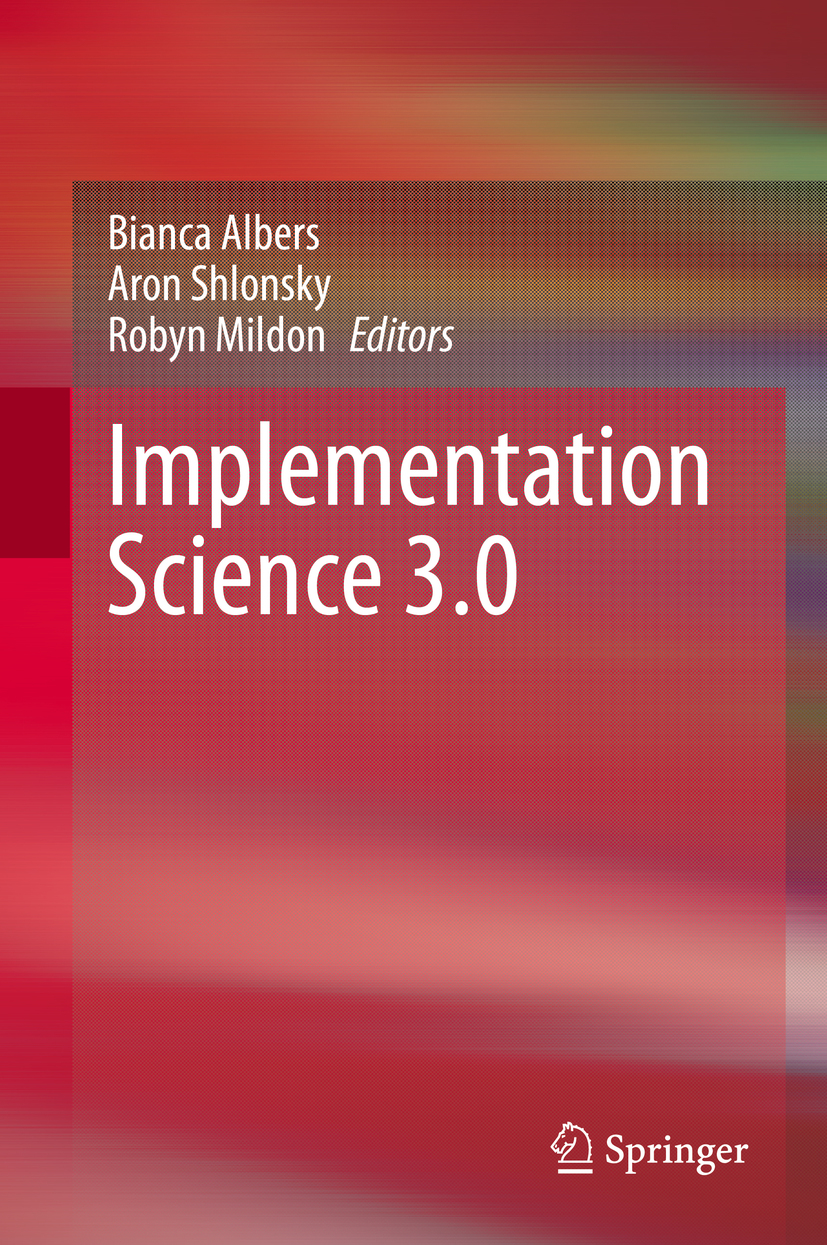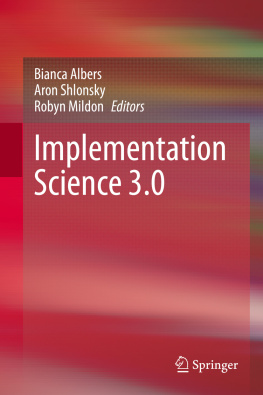Bianca Albers - Implementation Science 3.0
Here you can read online Bianca Albers - Implementation Science 3.0 full text of the book (entire story) in english for free. Download pdf and epub, get meaning, cover and reviews about this ebook. year: 2020, publisher: Springer International Publishing, genre: Politics. Description of the work, (preface) as well as reviews are available. Best literature library LitArk.com created for fans of good reading and offers a wide selection of genres:
Romance novel
Science fiction
Adventure
Detective
Science
History
Home and family
Prose
Art
Politics
Computer
Non-fiction
Religion
Business
Children
Humor
Choose a favorite category and find really read worthwhile books. Enjoy immersion in the world of imagination, feel the emotions of the characters or learn something new for yourself, make an fascinating discovery.
- Book:Implementation Science 3.0
- Author:
- Publisher:Springer International Publishing
- Genre:
- Year:2020
- Rating:4 / 5
- Favourites:Add to favourites
- Your mark:
- 80
- 1
- 2
- 3
- 4
- 5
Implementation Science 3.0: summary, description and annotation
We offer to read an annotation, description, summary or preface (depends on what the author of the book "Implementation Science 3.0" wrote himself). If you haven't found the necessary information about the book — write in the comments, we will try to find it.
Implementation Science 3.0 — read online for free the complete book (whole text) full work
Below is the text of the book, divided by pages. System saving the place of the last page read, allows you to conveniently read the book "Implementation Science 3.0" online for free, without having to search again every time where you left off. Put a bookmark, and you can go to the page where you finished reading at any time.
Font size:
Interval:
Bookmark:


This Springer imprint is published by the registered company Springer Nature Switzerland AG
The registered company address is: Gewerbestrasse 11, 6330 Cham, Switzerland
The wordimplementationis in the air. You can hear it whispered and shouted across academia, government, and providers of health and social services. That includes us. No doubt, the three of us have been infected by the implementation bug and have lived with it for a while. We belong to a continuously growing group of applied researchers interested in developing the field of implementation science, which and we should stress this from the beginning always includes practice.
Robyn Mildon has been a powerful voice in the human service sector for some time, continually pointing out to academics, service agencies, and governments that producing and translating evidence would amount to nothing if nobody actually used it; Aron Shlonsky, an evidence-based academic by training and by heart, has far too often experienced just how little evidence matters when governments fail to make effective services available; and Bianca Albers, after having led the dissemination and implementation of multiple research-informed programs in both government and nongovernment organizations, has learned that the importation of manualized interventions into real-world settings requires far more than youd think and often exceeds what you have.
One could therefore say that frustration brought us together close to a decade ago frustration about the many things that appeared to be in the way of getting evidence into practice. Since then, we have had numerous discussions about this new kid on the block implementation science. These centered on how to teach it, how to make it accessible to decision-makers, and how to integrate it into practice. Simultaneously, Robyn established the Southern Hemispheres first implementation-focused conference, now in its 10th year of operation, and Bianca the European Implementation Collaborative, and together, they co-founded the Centre for Evidence and Implementation, now operating from offices in Melbourne, Sydney, and Singapore. Simultaneously, Aron laid the foundation for moving two different university departments of social work toward a stronger focus on evidence-based and implementation-informed practice first at the University of Melbourne and since 2018 at Monash University. Hence, both the organizations we work in, andwe, as leaders in these organizations, have a considerable interest in continuously building a better understanding of what implementation science is, where it is heading and how it can be of use in human service practice.
Together, the three of us also began applying for and receiving a large number of government and service provider contracts aimed at helping to improve services through the use of evidence and implementation. This work has formed our understanding of how implementation processes unfold and how to best support and research them. It has also connected us to a network of international colleagues implementation scientists as well as intermediaries and implementation practitioners whose valuable work and thinking have influenced our own. Near the end of one decade of collaborating around implementation, it was only natural for us to develop a book together and to explore whether previous frustrations could be mixed with greater optimism. This book represents a curated selection of topics in implementation science that we view as central. Its primary aim is to take a critical but friendly approach to understanding what implementation science is, and isnt, specifically calling out areas where more evidence is needed.
In doing so, we are fundamentally encouraged by the progress of the discipline to date it has without a doubt been impressive. However, we are also worried that, as we have often observed with the term evidence-based practice, implementation science will become a term that people use for their own purposes perhaps uncritically and without a clear understanding of what it is. Moreover, even with an understanding of what it is, we have often observed a lack of humility about how complicated implementation can be and what it takes to successfully bring evidence into widespread use within complex health and social care systems. It is no small task, and failure is frequent. In fact, much of what we have learned is a result of challenging experiences in our applied work. We hope that as implementation science moves from infancy to toddlerhood, this collection of work will inform its development. Indeed, we look forward to Implementation Science 3.0 even as we finish our take on Implementation Science 2.0 with this book.
Implementing evidence begins with an introductory chapter that reflects our take on how implementation science has emerged from the evidence-based movement and developed into a separate scientific discipline with its own distinct theoretical and conceptual thinking, methods, measures, and research designs as well as its own scientific challenges and discussions. As such, this chapter provides the lay of the land of implementation science and functions as a pathway into the field especially for readers with an interest in a basic overview of the discipline. Following this introduction, Ariel Aloe and colleagues help us to focus on the what of implementation the knowledge or intervention to be used and applied in practice. When identifying this knowledge, many ourselves included stress the need to first figure out what is already known about the phenomenon of interest, for example, in the form of systematic reviews, rather than just taking action without leaning on prior knowledge. However, when having sourced the necessary evidence, we often get hung up on interpreting what we find because there is little in the literature that tells us how to interpret the findings within the context of the research at hand. Aloe and colleagues aim to fill this gap by introducing the CUTOS framework a framework detailing how to take context into account when interpreting evidence whiletrying to decide which service or practice to implement. In doing so, the authors make the very interesting point that generalization is more than generalizing to a population it is generalizing to a context.
Font size:
Interval:
Bookmark:
Similar books «Implementation Science 3.0»
Look at similar books to Implementation Science 3.0. We have selected literature similar in name and meaning in the hope of providing readers with more options to find new, interesting, not yet read works.
Discussion, reviews of the book Implementation Science 3.0 and just readers' own opinions. Leave your comments, write what you think about the work, its meaning or the main characters. Specify what exactly you liked and what you didn't like, and why you think so.










